
“Renfield” (2023). Cast: Nicholas Hoult, Nicolas Cage, Awkwafina, Ben Schwartz, Shohreh Aghdashloo, Adrian Martinez, Brandon Scott Jones, Camille Chen, Bess Rous, Jenna Kanell, Danya LaBelle, Rhonda Johnson Dents, Christopher Matthew Cook, Michael P. Sullivan, Rosha Washington, James Moses Black. Director: Chris McKay. Screenplay: Ryan Ridley. Story: Robert Kirkman. Web site. Trailer.
No one likes to go through life without access to one’s personal power. Doing so leaves us vulnerable to being taken for granted and under the thumb of others who care only about themselves and have no regard for us. If allowed to continue unchecked, such circumstances can become toxic co-dependent relationships that are difficult to escape, potentially trapping us in perpetuity. So how do we extricate ourselves from such situations? That’s the underlying focus of the new campy horror romp, “Renfield.”
For a seeming eternity, former real estate lawyer Robert Montague Renfield (Nicholas Hoult) has been a virtual slave to his powerful master. Having journeyed from his native England to Eastern Europe to close what he hoped would be a lucrative land deal to support himself and his family, Renfield approached his prospect with great gusto and enthusiasm, only to have the proposal take a drastic left turn when the target extends to him a proposal of his own – immortality. The seductive allure of that possibility wins over the young attorney, despite the strings that come attached with it, the most significant of which is agreeing to become a devoted servant to his new boss, an offer that Renfield readily accepts. But, despite what he’s been promised, Robert has no idea what he’s getting himself into given who his new master is – Dracula (Nicolas Cage).
In the years that follow, Renfield is introduced to high society and influential people. But, in exchange for this, he’s saddled with the responsibility of attending to all of his vampiric boss’s needs, such as going out every day and securing Dracula’s “dinner.” The routine gets old over time, and Renfield grows dissatisfied. He hasn’t seen his wife and child in ages, and the possibility of that happening grows progressively less likely. He also feels stuck in a meaningless existence with no hope of personal fulfillment. Nevertheless, he begins contemplating changes in his life, even though striking out in a new direction proves far more difficult than expected, keeping him trapped for decades.
After years of this, an event occurs that could change Renfield’s fortunes. Dracula is seriously injured when the night stalker is unexpectedly exposed to daylight, nearly causing his demise. His severely weakened condition requires intensive care to restore his health, and, because of this, he becomes more dependent on Renfield than ever. However, given the Count’s depleted state, he must remain in seclusion most of the time, holed up in an abandoned hospital in New Orleans, the duo’s adoptive new home. That convalescent isolation actually frees up Renfield’s routine somewhat; as long as he satisfies his master’s basic needs, there’s little that Dracula can do to keep tabs on his servant’s movements, enabling him to pursue his own interests, most notably changing his life to better suit what he wants from it.
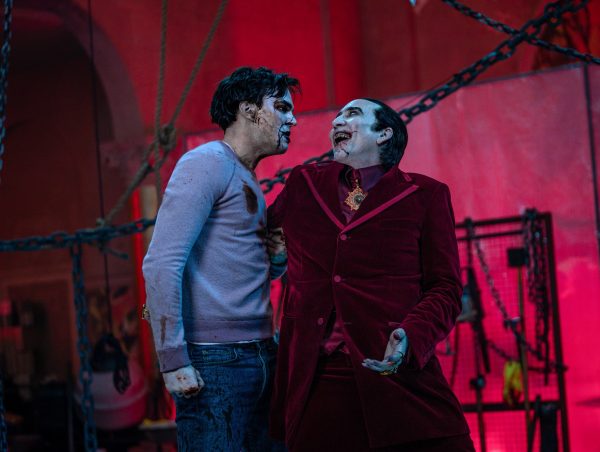
Renfield decides to enroll in a support group helping individuals who are wrestling with the challenges of toxic co-dependent relationships. This self-help program proves quite enlightening, especially when the group’s facilitator (Brandon Scott Jones) informs his organization’s newest member that the key to overcoming situations like this is to take steps to take back one’s sense of personal power. It’s a revelation akin to a proverbial lightbulb going off over Robert’s head, and so he starts taking steps to that end – clandestinely getting his own apartment, covering his walls in motivational posters, saying his daily affirmations and buying himself a more cheerful, upbeat pastel wardrobe. It’s all a far cry from the dour, dismal lifestyle he’s been accustomed to living for so long.
But, as Robert soon discovers, there’s more to taking back one’s power than simply acquiring transformative surface trappings and mouthing the words that go with these ideas. It’s a process that requires deeds as much as thoughts. He gets a chance to put that notion into practice when he unwittingly becomes embroiled with a powerful New Orleans mob family, the Lobo clan, particularly its chief braggart muscle man, Teddy (Ben Schwartz), and oily, glamour puss matriarch, Bellafrancesca (Shohreh Aghdashloo). When the Lobos stage a raid on a questionable nightspot, Renfield is present when the hit goes down and immediately springs into action to protect the club’s patrons, innocent bystanders caught in the crossfire. He also offers support to police authorities when they arrive on the scene, particularly an idealistic officer, Rebecca Quincy (Awkwafina). And, when all is said and done, Robert and Rebecca forge a solid connection based on both their intense interest in law enforcement and, to a lesser degree, one another.
The situation becomes further complicated when the Lobos go in search of this mystery man who thwarted their raid, a pursuit that eventually leads them to the abandoned hospital and to Renfield’s boss. When Dracula learns who they are, why they’re there and what Robert has quietly been up to, the Count feels betrayed. However, upon meeting the mob family, he also finds new allies to both seek out the traitor Renfield and to join forces with them in implementing his plan to take over both New Orleans and the world beyond.
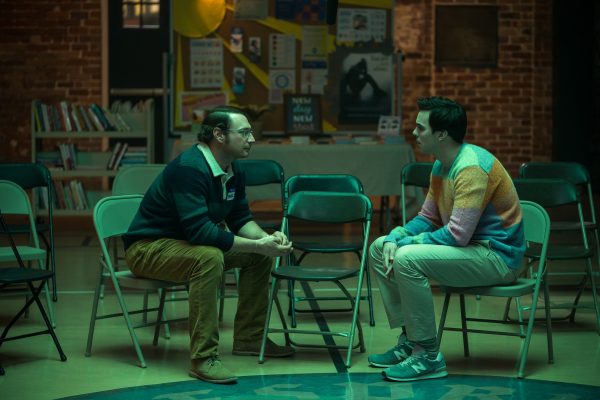
Before long, Robert and Rebecca get wind of what’s going on, and they realize what they’re up against. In addition to the alliance between Dracula and the Lobos, the enemies have the support of a police department that’s rotten to the core. Rebecca is already on the outs with the agency given her relentless investigation into the death of her father, a fellow officer. And, now that she’s taken a more aggressive posture to take down all the bad apples, she’s put herself and her sister, Kate (Camille Chen), an FBI agent, in jeopardy.
With circumstances like these, the deck is truly stacked against Robert. But conditions like these are in many ways ideal to prompt him to take action to take back his power. And, with a sidekick like Rebecca to offer ample inspiration, he’s got the means to put these practices into play. But will it be enough against the combined forces of Dracula, a powerful mob family and a monolithically corrupt police department? That’s a lot of power to be taken back.
However, this is not to suggest that nothing can be done about these situations. As the support group facilitator astutely observes, those who feel persecuted by their co-dependent relationships can change the game by taking back their personal power, something they often don’t realize they’ve given away (and voluntarily at that). Admitting this is half the battle, and believing that we can do something about it is the tonic. Of course, that belief component is crucial given the role it plays in manifesting the reality we experience as a result of the conscious creation process, the philosophy that makes this outcome possible. It’s unclear whether those seeking to make a change are aware of this school of thought, but those who opt to give it a try may well find themselves pleasantly surprised at the result.
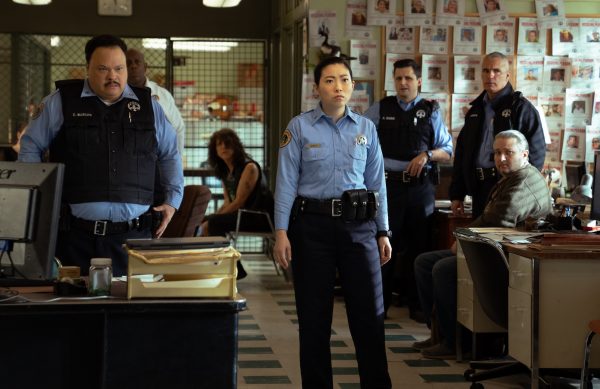
As anyone familiar with this thinking knows, beliefs are powerful and persistent tools. But, if we choose to give away that power to a co-dependent relationship partner, as Robert has done, it can leave us without the wherewithal to materialize what we want for ourselves. This is because all of our power and beliefs are focused on fulfilling the wants and needs of others, implicitly placing us in a secondary position. In the end, how fulfilling can that be? It’s a painful lesson that the protagonist has come to learn over many years, and he desperately wants to rectify that. Unfortunately, that may not be easy given how this precious resource has been drained from him in light of the power and persistence of the beliefs that have made this outcome possible.
This is not to say that Renfield can’t get his power back. However, he must believe in the possibility and take steps to realize its manifestation, first with his beliefs and intents and then with his actions. He’s obviously up against a lot to achieve that goal, but those forces can benefit Robert by prompting him to galvanize his convictions, to make sure he’s focused on and committed to attaining his objective. That can go a long way to making it happen.
A common misconception where co-dependency is concerned is that it’s limited to the dynamics associated with close personal relationships, be it with romantic partners or family members. But, in essence, it can also be tied to anything that prompts us to give away our personal power, functioning almost like an addiction. And, from that, it’s apparent that Robert is not the only one in the film afflicted with this condition.
For example, in order for the Lobo family to maintain its criminal empire and its control over the residents of New Orleans, its members have had to buy into a way of life in which they’ve sacrificed their personal power for the sake of their greed-driven goals. This has meant, of necessity, that they’ve had to accept violence, killing, mayhem and other similar atrocities as the norm, regardless of how they might affect them personally. It’s a huge trade-off that they’ve been coerced into making as a means to pursue their objectives and maintain their status.
Similarly, Dracula has had to do the same in order to live the life of a vampire. He’s had to give up being able to go outside during the daytime. He’s had to make sure that he has access to a steady supply of fresh blood for feeding. And he’s had to accept the consequences associated with failing to live up to these conditions. This choice has rendered him powerless against living his life any other way. In essence, he, too, has given away his personal power to fulfill this ambition.
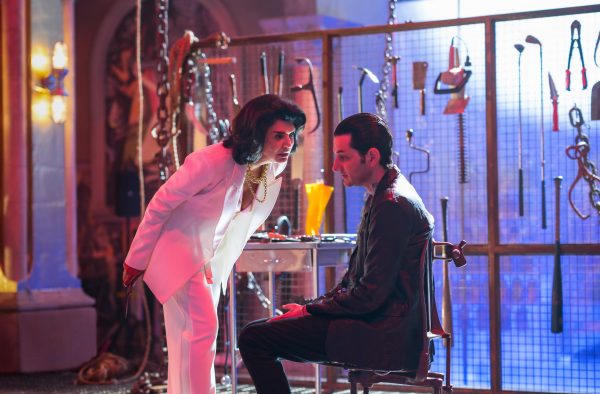
Then there’s the police department, which has made a comparable choice of its own. To benefit from the perks and payoffs that come from cooperating with organized crime, its high-ranking officers, such as Rebecca’s boss, Capt. Browning (James Moses Black), have compromised themselves to accommodate their partners in crime (literally). This, in turn, has alienated its virtuous staff members (and probably the citizens of New Orleans), leaving authorities to continually figure out ways to sustain themselves, a task that undoubtedly calls for them to routinely pour their energies into maintaining their position of power, a significant drain on this precious resource.
The sad part in all this is that none of the Lobos, Dracula nor the police fundamentally realize what they’ve gotten themselves into. By having to continually shore up their respective positions, they’re continually investing their power in simply maintaining the status quo. That lack of awareness and outpouring of power, in turn, have provided Robert and Rebecca with a valuable weapon against them – the ability to channel their own power into combatting what is becoming an innately dwindling resource, despite the combined forces that have arisen as a result of their unholy alliance. Who do you think is ultimately going to win that battle?
From the foregoing, the benefits of taking back one’s personal power should be obvious. But, as this film also illustrates, what often seems obvious to outside onlookers isn’t always readily apparent to those caught up in dicey situations like this. That’s why assessing and understanding our beliefs is so important, especially when it comes to the management of that power. If we remain oblivious or unconcerned, we run the risk of giving it away, leaving us unable to manage our affairs, particularly those where the input of that resource is important to fulfilling the objectives we hope to achieve. Robert and Rebecca understand this, and we’d be wise to follow their example.
I must admit that I had some doubts about this one going in. Those who know me are well aware that I’m not a huge fan of horror flicks (unless they’re smart horror or campy comedic romps). But director Chris McKay’s refreshingly humorous take on the Prince of Darkness mythology as told through the eyes of his longtime personal assistant pleasantly surprised me. As a melancholic soul who’s looking to get more out of life than the perpetuation of his unfulfilling tenure as a glorified go-fer, Renfield seeks to change his destiny, a sentiment that many of us can probably relate to. What I found most intriguing about this film is the way it successfully (and hilariously) merges the personal growth/self-help theme in a horror flick context, a brilliant fusion that works amazingly well. To be sure, considering the story’s horror roots, there’s plenty of blood-dripping gore as this yarn unfolds, but it’s all presented with a delightfully whimsical, albeit macabre sense of play, especially in its exceptionally well-choreographed, over-the-top campy action sequences, segments reminiscent of pictures like “The Kingsmen” and “Deadpool” franchises. The narrative also features ample sendups of the self-help/personal growth community, sequences that deliver big belly laughs at the expense of New Age dilettantes who believe that simply reciting a mantra will somehow lead to profound universal enlightenment.
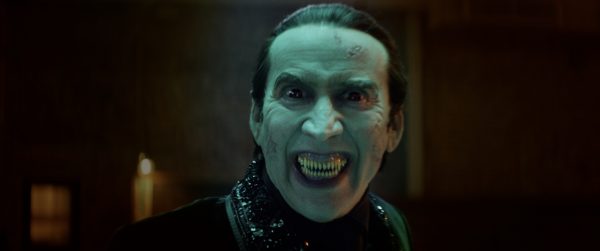
Admittedly, the pacing lags in a few spots, and the meshing of the story threads could have been handled a little more deftly at times. Nevertheless, despite these modest missteps, the laughs are definitely in huge supply here, thanks in large part to the film’s excellent cast, including the fine performances of Hoult as the lost but transformation-minded milquetoast and Aghdashloo as the cheesy mob matriarch. But the one who really steals the show here is Cage, who turns in his best work in years (perhaps even of an award-worthy caliber), memorably embodying the character of Dracula and genuinely making it his own, much like what Michael Keaton did with Beetlejuice and Ryan Reynolds has done with Deadpool. “Renfield” is truly a lot of fun, presenting a skillful blend of substantive, deceptively nuanced material wrapped up in a vehicle where such content is least likely expected. So go sink your teeth into this one; you’re sure to have a bloody good time. The film is playing theatrically.
Freely giving away something that’s so vital to the functioning of our daily lives can carry grave consequences, outcomes that we often can’t see or aren’t even aware of until it’s too late. And, when this practice is allowed to settle in and get cozy, reversing it can be exceedingly difficult. But, considering what’s at stake, it would behoove us to make the effort to get it back before there’s no hope of retrieving it. As something that’s the lifeblood of our existence, we can’t afford to recklessly dispense it. Considering what we’re potentially giving up by doing so, we stand to lose too much – and that would surely leave us in the lurch, where no amount of self-help practices can help us get it back.
Copyright © 2023, by Brent Marchant. All rights reserved.

No comments:
Post a Comment